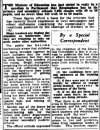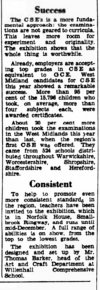Tau WOW! this has got deep and very interesting, there was a difference between secondary modern schools and grammar schools, what they taught and how they taught it. I went BVGS and that was all university èducated teachers who wore gowns and were strong disciplinarians, where the classics ruled as did music and ŕugby, where the sports master was a county cricketer and the boys were from the three classes. I remember my mother embroidering the bishops mitreon to a black blazer bought from a shop in Dale End, because mum and dad could not afford the recommended blazer from the outfitters on Sutton parade and I was not alone. Top dog at Green Lanes,I struggled at BVGS, left on the last day of the fifth year term and started at Dunlop the following Monday. Now all these years later, I realise that I learned a lot and how lucky I was that I passed the eleven plus. I first noticed when I heard my sons calling their teachers by their first name and lately in the job I have just retired from, how little the modern child knows in some circumstances. The winner was I thought the Midlands in Birmingham.
Bpb



